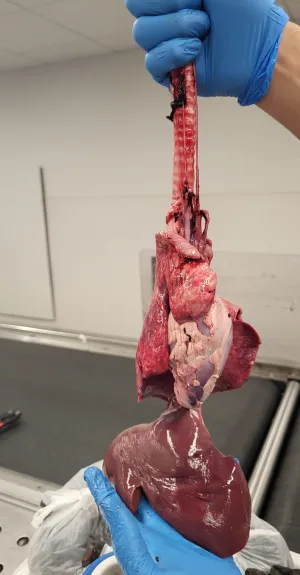CHICAGO—U.S. Customs and Border Protection Agriculture Specialists (CBPAS) at Chicago O’Hare International Airport (ORD) stop countless prohibited items foreign guests try to introduce into the U.S., whether it is fruits, vegetables, plants, or other forbidden items. However, their latest seizure, an eviscerated goat, is certainly outside of the normal items they stop.
On October 10, two passengers arriving from the Democratic Republic of Congo were referred to agriculture secondary for inspection. CBPAS inspected their baggage and found one pound of unknown meat, 2 pounds of garden eggs, and 15 pounds of raw goat viscera including the trachea, heart, lungs, liver, kidneys, and entire digestive system. Agriculture Specialists seized and destroyed the prohibited items to keep livestock diseases and plant pests out of the United States.
“There are real dangers these items can have if they are introduced in the U.S. economy,” said LaFonda D. Sutton-Burke, CBP Director, Field Operations-Chicago Field Office. “All passengers, whether entering or returning to the U.S., must be truthful and declare all items they are bringing. If one prohibited item enters the U.S. it could have dangerous ecological or economical results.”
Just last week U.S. CBPAS at Minneapolis – Saint Paul International Airport (MSP) seized a small box containing giraffe fecal material.
“Items like these can harbor pests and diseases, if introduced into our agriculture systems or natural resources, could cause significant damage to our food supply or native species,” said Michael Pfeiffer, Area Port Director, Chicago. “Our agriculture specialists are dedicated to protecting these essential American resources from foreign pests and diseases.”
CBP recommends people who wish to import plant materials, animal materials and other agricultural items consult the CBP Information Center section on the CBP website or call (877) 227-5511. Additionally, arriving passengers should always declare all items acquired abroad to CBP officers to avoid civil or criminal penalties and reduce the risk of introducing pests and disease to the United States.
CBP's border security mission is led at our nation’s Ports of Entry by CBP officers and agriculture specialists from the Office of Field Operations. CBP screens international travelers and cargo and searches for illicit narcotics, unreported currency, weapons, counterfeit consumer goods, prohibited agriculture, invasive weeds and pests, and other illicit products that could potentially harm the American public, U.S. businesses, and our nation’s safety and economic vitality.
Learn what CBP accomplished during "A Typical Day" in 2022 and learn more about CBP at www.CBP.gov.


